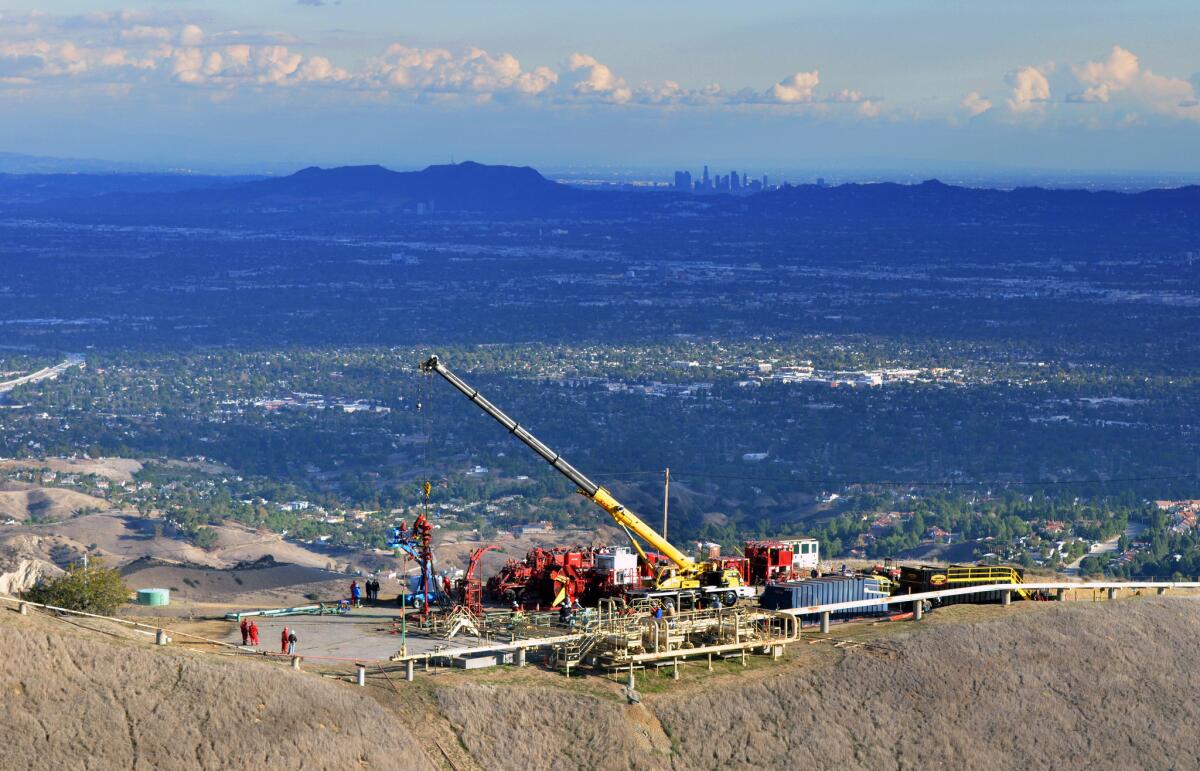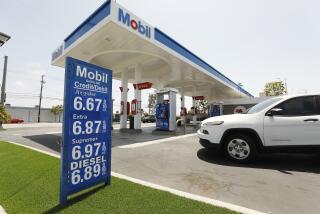Editorial: The real emergency at Porter Ranch? California’s dangerous dependence on fossil fuels.

SoCalGas crews and technical experts attempt to safely stop the flow of natural gas leaking from a storage well at the utility’s Aliso Canyon facility near Northridge section of Los Angeles.
It took a while, but Gov. Jerry Brown finally declared a state of emergency at Porter Ranch, where a 75-day-old natural gas leak has forced thousands of people from their homes. For weeks residents and elected officials have called on Brown to elevate the catastrophic leak to emergency status, which, they said, could help make state funding available to aid the community. But the fiscally conservative governor has been wary of using the designation — and rightfully so — because he didn’t want to taxpayers to get stuck with costs that are the responsibility of Southern California Gas Co. His proclamation makes clear that the gas company, and not the taxpayers or the utility’s ratepayers, will be responsible for all expenses related to the leak at the company’s nearby Aliso Canyon gas storage facility.
The leaking well at Aliso Canyon has emitted as much greenhouse gas as 330,000 passenger vehicles produce in a year.
While much of the announcement Wednesday formalizes what state agencies have already required of the gas company, the proclamation also begins to address environmental and safety issues facing underground gas storage facilities that have largely gone unnoticed until now.
The dozen gas fields in the state can dramatically increase greenhouse gas emissions if they are not controlled. The primary component of natural gas is methane, a potent heat-trapping pollutant that hastens climate change. The leaking well at Aliso Canyon, as of Dec. 22, had emitted as much greenhouse gas as 330,000 passenger vehicles produce in a year. Brown’s proclamation says that the gas company will be responsible for funding projects to cut greenhouse gas pollution and offset the methane emitted from the leaking well.
Brown’s order also calls for emergency regulations requiring operators of gas storage facilities around the state to take new safety and reliability precautions. Storage operations have had fairly lax regulation, compared to other sectors of the oil and gas industry, even as the facilities have gotten older and more prone to leaks. The utility, for example, knew the wells at its Aliso Canyon facility were corroding and failing at an increasing rate, but there are rules mandating frequent inspections. The leaking well didn’t have a working safety valve, which could have stopped the flow of gas once a problem was discovered. But such a valve isn’t required by law.
FULL COVERAGE: Porter Ranch gas leak >>
Brown also directed state energy and environmental agencies to study the long-term viability of natural gas storage facilities in the state, both from a safety and climate change perspective. That’s essential. The Porter Ranch leak makes clear the hidden costs of our dependence on fossil fuels. As long as California needs natural gas, the state has an obligation to strictly regulate operations to protect residents. But the ultimate goal should be cleaner, safer energy sources.
Follow the Opinion section on Twitter @latimesopinion and Facebook.
MORE FROM OPINION
Are we making too much of ‘Making a Murderer’?
Are the activists occupying Malheur National Wildlife Refuge in Oregon ‘terrorists’?
Opponents fail to derail the state’s right-to-die measure, but they may yet try again in court
More to Read
A cure for the common opinion
Get thought-provoking perspectives with our weekly newsletter.
You may occasionally receive promotional content from the Los Angeles Times.










